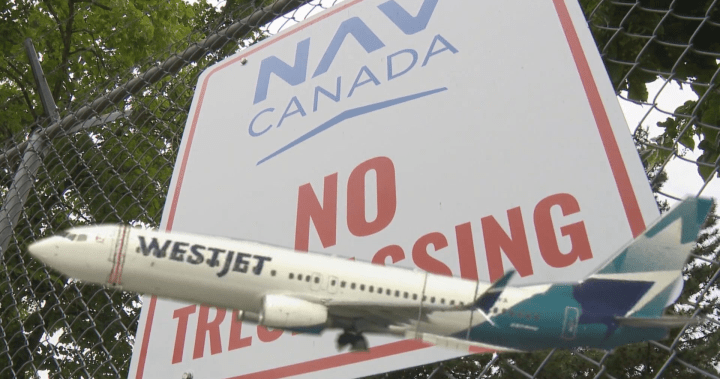Article – Air traffic control tower shortages are threatening to create turbulence for Canadian summer travelers, with WestJet now sounding the alarm about potential widespread disruptions across the country’s busiest travel season.
The Calgary-based airline recently warned passengers to brace for what could be a chaotic summer, pointing directly to what industry insiders have been whispering about for months: Canada simply doesn’t have enough air traffic controllers to handle the expected surge in flights.
“We’re deeply concerned about Nav Canada’s ability to staff towers and control centers adequately through peak travel periods,” said Diederik Pen, WestJet’s Chief Operating Officer, during an industry briefing last week. “Our preliminary scheduling shows we may need to reduce frequencies on certain routes if the situation doesn’t improve rapidly.”
This isn’t just corporate anxiety talking. Transport Canada data reveals air traffic controller numbers have dropped nearly 15 percent below optimal staffing levels at major hubs including Toronto Pearson, Vancouver International, and Montreal-Trudeau airports. The staffing crisis has been building silently in the background while the industry recovered from pandemic disruptions.
Behind the controller shortage lies a perfect storm of challenges. An aging workforce saw accelerated retirements during COVID-19, while training programs for new controllers faced pandemic-related suspensions and delays. The profession’s demanding certification process typically requires 12-18 months of intensive training before controllers can work independently.
Nav Canada, the private non-profit corporation managing the country’s civil air navigation services, acknowledges the problem but insists contingency plans are being developed. “We’re implementing targeted recruitment strategies and accelerated training programs to address current staffing challenges,” said Diana Dunfield, Nav Canada’s Vice President of Operations.
However, aviation experts remain skeptical about quick fixes. Former air traffic controller and aviation safety consultant James Morency told me during a phone interview that the shortage represents years of inadequate workforce planning. “You can’t simply manufacture qualified controllers overnight. The precision and stress management this job requires means there are no shortcuts in training.”
For passengers, the potential impact could mean more than just delays. Reduced controller staffing often necessitates increased spacing between aircraft, effectively lowering the capacity of airspace and airports. This translates to schedule adjustments, flight consolidations, and in worst-case scenarios, cancellations – particularly for regional routes serving smaller communities.
The Canadian Air Traffic Control Association has been warning about this workforce crisis for years. Union president Peter Duffey pointed out in a recent statement that controller fatigue represents a significant safety concern. “Controllers are working increased overtime and facing mounting pressure. This isn’t sustainable from either a workforce retention or safety perspective.”
At Toronto Pearson, Canada’s busiest airport, officials are already discussing contingency plans. A source within the Greater Toronto Airports Authority, speaking on condition of anonymity, shared that airlines have been asked to consider schedule adjustments during peak periods to better match available controller capacity.
For communities dependent on air connectivity, the impacts could be particularly harsh. Northern and remote regions already struggling with limited service could face further isolation if airlines prioritize maintaining schedules on their most profitable routes.
Federal Transport Minister Pablo Rodriguez has promised action, announcing a working group including Nav Canada, airlines, and controller representatives. “Ensuring our aviation system has the workforce needed to operate safely and efficiently is a top priority,” Rodriguez stated during a press conference in Ottawa.
But critics like Conservative transport critic Mark Strahl argue the response is too little, too late. “This government has known about looming controller shortages for years and failed to ensure proper workforce planning. Now Canadian travelers and businesses will pay the price.”
The shortage comes at a particularly inopportune moment as Canadian airlines projected record summer travel seasons, with pent-up demand following years of pandemic restrictions. Industry data from the Air Transport Association of Canada shows advance bookings for summer 2024 running 12% higher than pre-pandemic 2019 levels.
For travelers, experts recommend purchasing travel insurance with comprehensive cancellation coverage and building flexibility into summer travel plans. “Consider avoiding the absolute peak travel days, and when booking connections, allow more buffer time than you normally would,” suggests Gabor Lukacs, founder of Air Passenger Rights, a Canadian air passenger advocacy group.
Small business owner Melissa Chen, who relies on regular flights between Toronto and Vancouver for her clothing import business, expressed the frustration many frequent flyers feel. “After all the pandemic disruptions, we finally thought air travel was getting back to normal. Now this? It makes planning business travel almost impossible.”
As airlines and Nav Canada scramble for solutions, one thing remains clear – the complex ecosystem that keeps planes safely moving through Canadian skies is under unprecedented strain. Whether authorities can recruit and train enough controllers before the summer crunch hits will determine if WestJet’s warning becomes reality.
For now, Canadian travelers might want to pack an extra dose of patience along with their summer travel essentials.






